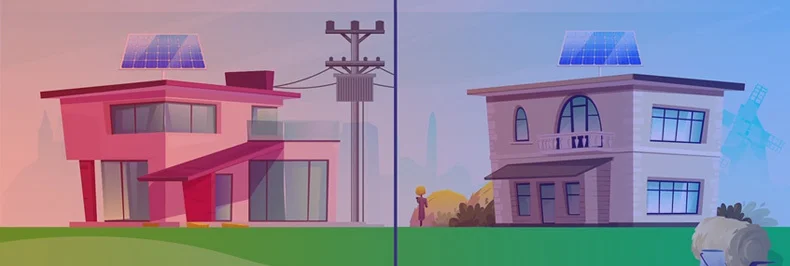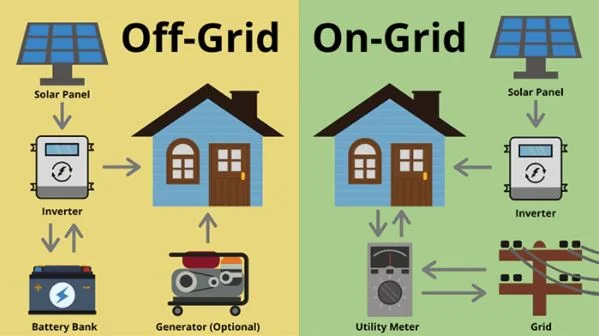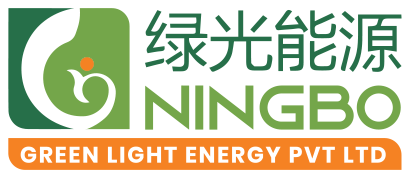
Solar panel systems are used to provide electricity by converting sunlight into usable energy through photovoltaic cells. A solar panel system comprises several basic components and some components that can be added or removed depending on the type of solar system and the requirements.
A solar panel system can produce electricity only when there is sunlight available. The rest of the time the solar panel system will not operate. Solar panel systems can be either on-grid, off-grid, or hybrid systems to cater to this problem. Your solar panel system installer will guide you to which system will be best suited for your needs.
On-grid system:
An on-grid system is also referred to as a grid-tied solar system which means that it is connected to the utility grid. It is the most commonly used solar system for residential and commercial requirements. This system is beneficial as it does not require the use of additional batteries for storing power. A huge battery backup to suffice electricity requirements when the solar panel system is not producing electricity is very costly and will increase the upfront cost. On-grid systems make use of the electricity produced by the utility when the system is not producing sufficient energy to meet needs is or malfunctioning. This means your energy needs will be fulfilled without costing you a huge amount of batteries.
However, on-grid solar systems will not operate in case of a utility power failure. If the utility is facing a power failure, the on-grid system will also automatically stop its production. This is done for the safety of the people at the grid working to resolve the power failure. This makes an on-grid system unsuitable for places that experience lots of power failures.
Off-grid system:
As the name specified, off-grid systems are not connected to the utility grid and operate independently. Since these systems are not connected to the grid, battery storage is a must in these systems. The off-grid system is designed to meet all energy needs of the pace where it is installed. For this, huge battery storage capacity and off-grid inverters are used, which are quite costly. Therefore, off-grid systems are more expensive as compared to on-grid systems. These systems are best suitable for places far from the electricity grid or are in a remote location like army camps, communication towers, remote rural areas, mining areas, remote farms, street lightings, or highway motels. Off-grid solar systems are also popularly used by RVs and caravans to power their appliances.
The benefit of using an off-grid solar system is that you can enjoy an uninterrupted power supply even in case of utility power failures if you have sufficient battery backup.

Differences between on-grid and off-grid solar systems:
The first and obvious difference between the two systems is that on-grid systems are connected to the grid, whereas off-grid systems are not connected to the grid. But there are a lot of differences between them. Let’s have a look at the significant differences:
1. Access to electricity:
With an off-grid system: an off-grid system has no outside source to access electricity. It can only have power when the system is producing it. This means there will be access to electricity only when there is sunlight. To have access to electricity at all times, an off-grid system must have a massive battery backup that can store electricity produced during the daytime and then supply it when the system is not producing electricity. If there is a higher electricity demand, a generator may also need to be connected to the off-grid system.
With an on-grid system: an on-grid system is connected to the utility grid, making access to electricity easier. You can enjoy electricity even when your solar system is not working or producing sufficient electricity to meet your needs. Being connected to the grid helps you to enjoy electricity at all times, whether you are producing it or not. However, in case of a utility power failure, your on-grid system will also seize to operate.
2. Grid power outages:
Off-grid system: a power outage of the grid will not affect the operation of an off-grid system. Since an off-grid system works independently, any power outage will not change the access to electricity. You can enjoy an uninterrupted power supply even in case of a power failure.
On-grid system: this system is connected to the grid and hence can access electricity. However, in case of a power failure, you are also bound to be deprived of electricity. Your on-grid system will also not operate in case the power at the grid fails. This is the rule that you have to abide by in an on-grid system. This is done to protect the utility workers from getting an electric shock while fixing the grid.
3. Excess electricity production management:
Off grid-system: there are times when the system may be producing excess electricity than is needed depending on the system size, usage, and weather conditions. Surplus electricity may also be produced if your system is large enough and your use is more petite. Moreover, an off-grid system is designed to produce excess electricity, which can be used for future uses. In an off-grid system, there are batteries connected to the system, enabling excess electricity storage. This extra electricity can be used to power the house at night or when the weather is cloudy, and the system is not producing sufficient electricity.
To have sufficient electricity storage to cater to all energy needs, a large battery bank is needed. This can make the solar project way over budget.
On-grid system: like in an off-grid system, an on-grid system can also produce excess electricity than is required. In the case of an on-grid system, this excess electricity will be delivered to the grid. If there is no meter connected at the point providing to the grid, then all of the extra electricity will go unaccounted for. Thankfully, most on-grid systems have a net meter installed to account for the excess electricity. You need to apply for a net meter through an application. The net meter credits for your excess electricity, and when you use electricity from the grid, you can use those credits instead of paying for the used electricity. This way you can save up on lots of money.
4. Billing:
Off-grid system: An off-grid system is not connected to the grid and, therefore, does not use any electricity produced by the grid, no use its services. Hence, an off-grid system will not receive any electricity bill. Still, an off-grid system costs more because of the expensive battery bank that needs to be installed.
On-grid system: the solar panel system, in this case, is connected to the grid which means, the system is using the utility’s services like transmission and distribution lines. The grid-tied system will be charged for these services. Moreover, a fixed charge of getting connected to the grid also needs to be paid. Other than these service charges, you may sometimes find that you have been charged for the electricity used from the grid. This happens when there is no credit left to cover up the electricity used.
Conclusion:
Both the on-grid and off-grid systems have their pros and cons, and no system is better than the other. It all depends on your energy usage, location affordability, and feasibility. An off-grid system will be the best choice for a particular situation, while for another situation, an on-grid system may be a better option. Consult a professional solar system installer to determine what is best for you.

